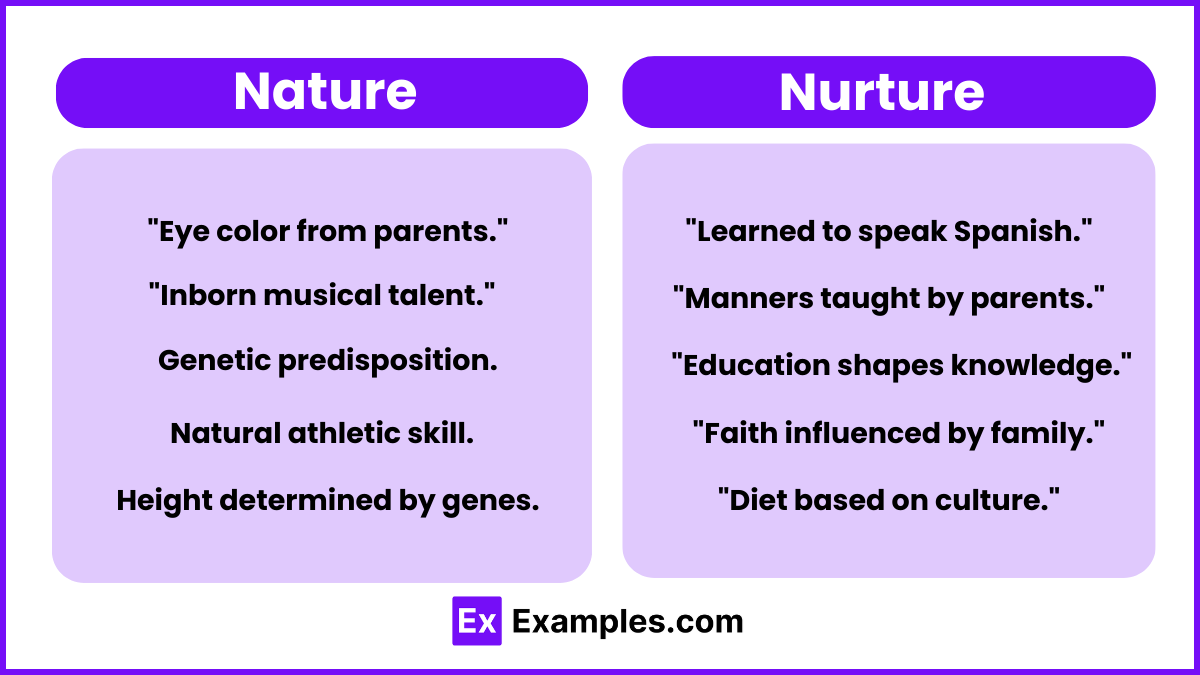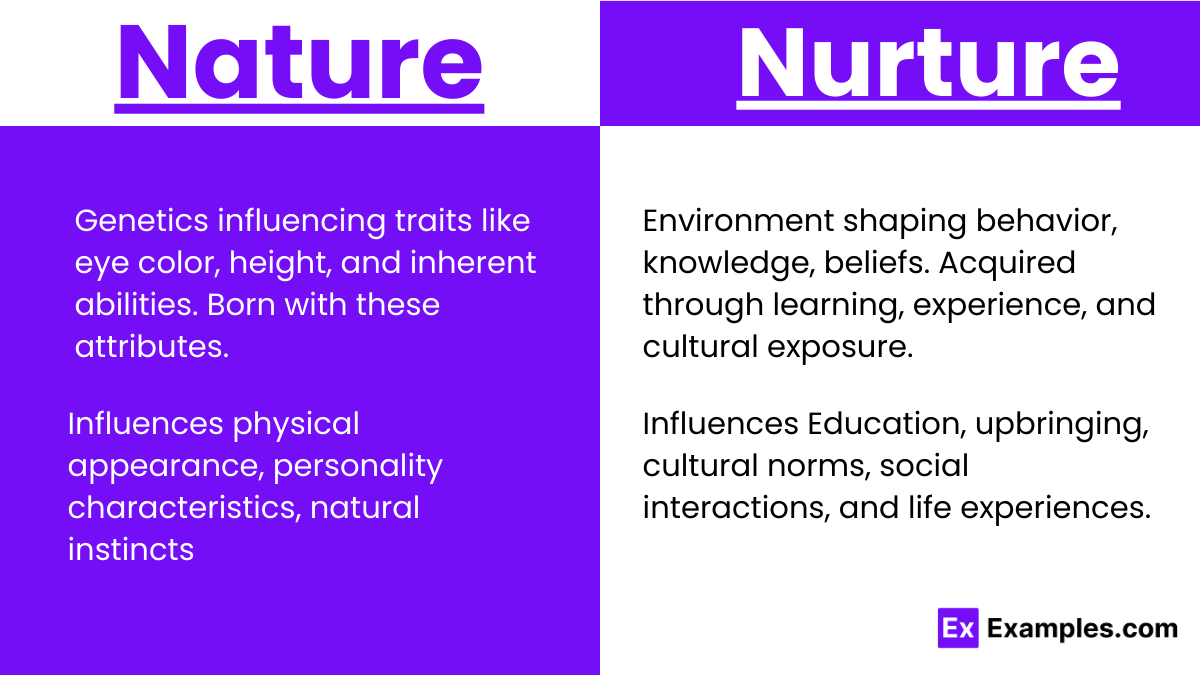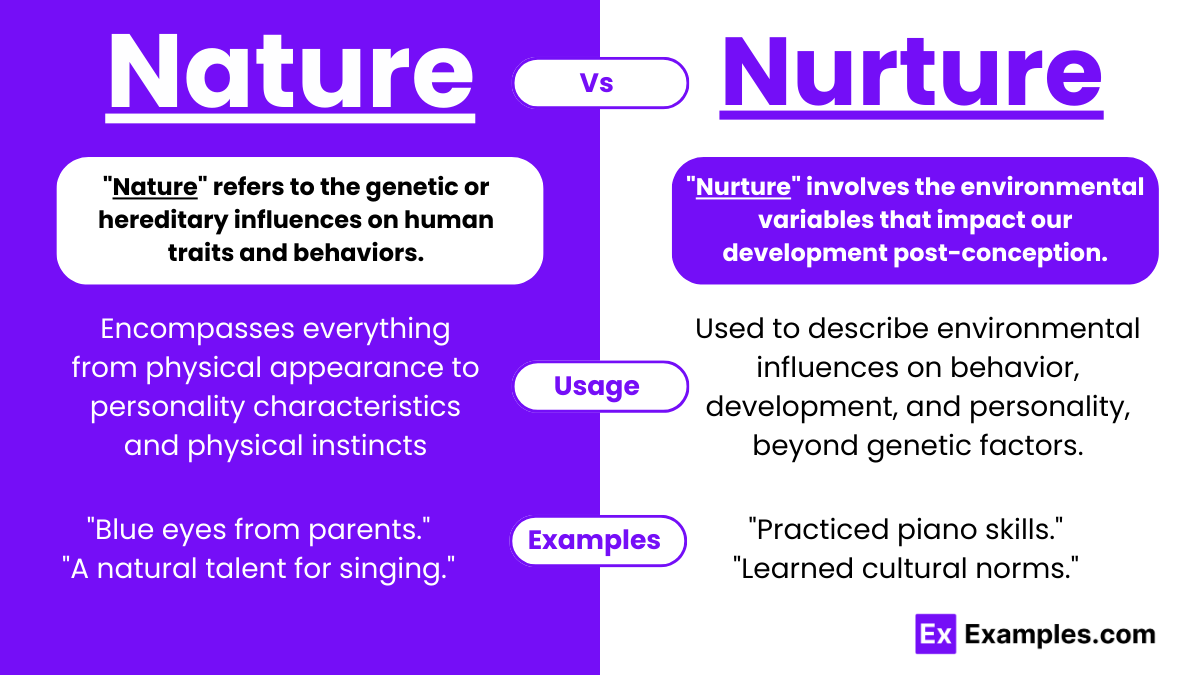Nature vs Nurture : Examples, Differences, Usage
Exploring the complex debate between Nature vs Nurture presents a fascinating challenge, one that intrigues scholars, psychologists, and the curious mind alike. At the heart of human behavior and personality development, these two forces play crucial roles, yet understanding their interplay and impact can often seem overwhelming. This article seeks to clarify this dynamic interaction, providing a comprehensive guide to navigate through the complexities of Nature vs Nurture.
Grasping the essence of how genetic makeup (Nature) and environmental influences (Nurture) shape individuals is fundamental for a deeper understanding of human psychology. By the conclusion of this exploration, readers will be armed with essential insights into the debate, capable of appreciating the delicate balance between inherited traits and acquired characteristics. Embark with us on this enlightening journey to uncover the pivotal elements that define and drive the Nature vs Nurture discussion, aiming to make this intricate topic accessible and comprehensible.
Nature and Nurture – Meanings
The debate between Nature and Nurture centers around the contributions of genetic inheritance (Nature) and environmental factors (Nurture) to human development.
- Nature refers to the genetic or hereditary influences on human traits and behaviors. This encompasses everything from physical appearance to personality characteristics and natural instincts, all of which are encoded in our DNA. The argument for Nature suggests that the essence of who we are comes predetermined by our genetic makeup at the moment of conception, influencing aspects such as intelligence, temperaments, and susceptibility to certain diseases.
- Nurture, on the other hand, involves the environmental variables that impact our development post-conception. This includes a broad range of experiences from our upbringing, such as the education we receive, our interactions with family and peers, cultural norms, and even the food we eat. Proponents of the Nurture argument believe that human behavior and identities are primarily shaped by life experiences and the surrounding environment.
The Nature vs Nurture debate is fundamental in understanding human psychology, development, and behavior, as it explores how much of who we are is born with us and how much is influenced by our environment.
Summary
The debate between Nature and Nurture explores the relative contributions of genetic inheritance and environmental factors to human development. Nature refers to the hereditary influences on traits and behaviors, suggesting that aspects like physical appearance, personality, and natural instincts are predetermined by our DNA. Conversely, Nurture involves environmental impacts post-conception, encompassing experiences from upbringing, education, cultural norms, and interactions with family and peers, arguing that human behavior and identities are shaped by life experiences. This fundamental discussion in human psychology, development, and behavior delves into the extent to which who we are is innate versus molded by our surroundings.
Difference Between Nature and Nurture
| Aspect | Nature | Nurture |
|---|---|---|
| Definition | Refers to genetic or hereditary influences on human traits and behaviors. | Involves environmental factors impacting development after birth. |
| Influences | Physical appearance, personality characteristics, natural instincts, intelligence, temperaments, and susceptibility to diseases. | Education, upbringing, cultural norms, social interactions, and life experiences. |
| Belief | Suggests that the essence of who we are is predetermined by our genetic makeup at conception. | Believes that human behavior and identities are primarily shaped by environmental experiences. |
| Focus | On the biological and genetic endowments inherited from parents. | On the external social, cultural, and educational experiences that influence development. |
| Debate | Argues for the importance of inherited characteristics in determining behavior and traits. | Argues for the significance of environmental influences and experiences in shaping individuals. |
How Genetic and Environmental Factors Are Identified
Identifying the influence of genetic and environmental factors on human traits and behaviors involves a combination of scientific methods and studies. Here’s how these factors are typically distinguished:
Genetic Factors
- Twin Studies: Researchers study identical twins (who share 100% of their genes) and fraternal twins (who share about 50% of their genes) to assess how much a trait is influenced by genetics. If identical twins show more similarity in a trait compared to fraternal twins, this suggests a genetic contribution.
- Adoption Studies: These studies compare adopted children to their biological and adoptive parents. Similarities between the children and their biological parents can indicate genetic influences, while similarities to adoptive parents suggest environmental factors.
- Genome-Wide Association Studies (GWAS): GWAS scan the genomes of many individuals to find genetic markers that correlate with specific traits or diseases. This helps identify specific genes or genetic variations associated with particular characteristics.
- Family Studies: By examining traits across generations in families, researchers can see how genetics play a role in transmitting traits from parents to offspring.
Environmental Factors
- Longitudinal Studies: These studies follow individuals over a period of time to observe how exposure to different environments affects outcomes. They can help identify critical periods when environmental factors are particularly influential.
- Cross-Cultural Studies: By comparing behaviors and traits across different cultures, researchers can identify how cultural environment influences human behavior.
- Controlled Experiments: In some cases, researchers manipulate environmental variables to see how they affect outcomes. While ethical considerations limit the types of experiments that can be done with humans, animal studies often use this approach.
- Case Studies: Individual or group case studies can provide detailed information about how unique environmental conditions, such as extreme deprivation or enriched environments, impact development and behavior.
Combining Methods
Often, a combination of these methods is used to tease apart the effects of nature and nurture. For example, twin studies may be complemented by adoption studies to provide a fuller picture of how genetics and environment interact. Additionally, advances in technology and data analysis are enabling more sophisticated analyses of the interaction between genetic predispositions and environmental influences, further illuminating the complex interplay between nature and nurture.
Examples of Nature and Nurture

Nature Examples:
- Genetics Affecting Health: A person’s genetic code can predispose them to conditions like heart disease or diabetes, showcasing how inherited traits impact health.
- Innate Temperament: Some individuals are born with a naturally calm demeanor or a predisposition towards anxiety, indicating how genetics influence personality.
Nurture Examples:
- Language Skills: A child learns to speak the language that is spoken in their home and community, demonstrating the role of environment in language acquisition.
- Cultural Norms: An individual’s practices, traditions, and daily habits are shaped by the culture they grow up in, reflecting environmental influences on behavior.
Nature vs. Nurture Scenarios:
- Intelligence: While a person might inherit a potential for intelligence from their parents (Nature), their intellectual development is significantly influenced by access to education, stimulation during early childhood, and nutritional status (Nurture).
- Athletic Ability: A natural predisposition for physical strength and coordination may give an individual an edge in sports (Nature), but training, coaching, and practice play crucial roles in developing athletic skills (Nurture).
- Musical Talent: A person may be born with a natural ear for music or inherent musical talent (Nature), but mastering an instrument or developing a singing voice typically requires years of practice and instruction (Nurture).
- Social Behaviors: Innate personality traits can influence how sociable or introverted a person is (Nature), yet social skills are honed through interactions with family, peers, and social settings (Nurture).
- Career Choices: Natural inclinations and abilities may steer an individual towards certain professions (Nature), but educational opportunities, mentorship, and life experiences often play a decisive role in career path decisions (Nurture).
When to Use Nature and Nurture

Usage of “Nature”:
- Discussing Genetics: When referring to the genetic inheritance or biological predispositions of individuals, such as their DNA, inherited physical traits, or natural instincts.
- Exploring Heredity: In contexts where you’re examining how certain traits or diseases are passed down through generations.
- Analyzing Innate Abilities: When considering talents or abilities that individuals seem to be born with, such as natural aptitudes for music, art, or athleticism.
- Considering Personality Traits: In discussions about inherent personality characteristics, such as being naturally introverted or extroverted.
Usage of “Nurture”:
- Examining Environmental Influences: When discussing how a person’s environment, including their upbringing, education, and social interactions, has shaped their behavior or traits.
- Looking at Cultural Impact: In conversations about how cultural background and societal norms influence beliefs, values, and behaviors.
- Considering Learned Behaviors: When analyzing behaviors or skills that have been acquired through experience, education, or training.
- Discussing Life Experiences: In contexts where the focus is on how specific experiences, such as trauma, enrichment activities, or parental styles, affect development and personality.
Applying Nature and Nurture:
Understanding when to apply “nature” and “nurture” is crucial for accurately discussing human behavior and development. These terms are not mutually exclusive but are often used together to explain the complex interplay between genetic predispositions and environmental factors. For example, when analyzing the origins of certain behaviors or conditions, such as intelligence, mental health issues, or even preferences and aversions, it’s essential to consider both nature and nurture. Acknowledging both perspectives provides a more comprehensive understanding of the individual differences and similarities among people.
The Nature-vs.-Nurture Debate
The Nature-vs.-Nurture debate is a longstanding discussion within psychology, sociology, and genetics, focusing on the relative contributions of genetic inheritance (Nature) and environmental factors (Nurture) to human development and behavior. This debate examines to what extent our genes and our environment influence our personality, intelligence, behavior, and many other aspects of our being.
- Central Question: The Nature-vs.-Nurture debate explores whether genetic inheritance (Nature) or environmental factors (Nurture) play a more significant role in shaping human behavior, personality, and traits.
- Nature Argument: Proponents believe that genetics and biological factors determine much of who we are, influencing everything from physical characteristics to innate behaviors and personality traits.
- Nurture Argument: Advocates argue that environmental influences, including upbringing, culture, education, and personal experiences, are crucial in shaping individuals’ behaviors, beliefs, and abilities.
- Evolution of the Debate: Advances in genetics, psychology, and neuroscience have led to a more nuanced understanding that both nature and nurture interact complexly to influence human development.
- Interactionist Perspective: Modern views emphasize the interaction between genetic predispositions and environmental factors, recognizing that they are not mutually exclusive but interdependent.
- Epigenetics: This emerging field studies how gene expression is influenced by environmental factors, highlighting how the environment can affect genetic potential.
- Genetic Predispositions: Research shows that while individuals may have genetic predispositions for certain traits or behaviors, environmental factors can activate, suppress, or modify these genetic potentials.
- Environmental Impact: Studies demonstrate that environmental conditions can significantly alter the course of development, even in areas where genetic predispositions are strong.
- Practical Implications: Understanding the interplay between nature and nurture has significant implications for education, healthcare, psychology, and public policy, guiding approaches to support individual development.
- Continuing Research: Ongoing research seeks to further understand how specific genes and environmental variables contribute to complex traits and behaviors, moving beyond the debate to a comprehensive view of human development.
What is the nature vs. nurture approach?
This approach investigates how genetic inheritance (nature) and environmental factors (nurture) influence and determine individual behaviors, traits, and overall development.
Why is the nature vs. nurture debate important?
It’s crucial for understanding the origins of behavior and traits, guiding approaches in psychology, education, and healthcare, and informing debates on human free will and social responsibility.
What is nature vs. nurture in human development?
In human development, this debate explores the extent to which genetics and environment contribute to physical growth, personality formation, intelligence, and other aspects of development.
What is the conclusion of nature vs. nurture?
The consensus is that both genetic and environmental factors interact complexly to shape individuals, with neither being solely responsible for a person’s development and characteristics.



